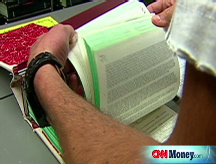Oil prices jump as Gustav threatens
Crude settles above $118 a barrel over concerns that Tropical Storm Gustav could damage oil facilities in the Gulf of Mexico - site of 25% of U.S. oil production.
NEW YORK (CNNMoney.com) -- Oil prices ended the day higher on Wednesday as Tropical Storm Gustav approached the Gulf of Mexico.
U.S. crude settled up $1.88 to $118.15 a barrel on the New York Mercantile Exchange. Crude had traded as high as $119.63 a barrel during the session. Wednesday's settlement is the highest close since last week, when oil closed at $121.18 on Thursday, Aug. 21.
Weather worries dominated the oil markets on Wednesday.
"What we could see is that (the storm) destroys some rigs," said Amanda Kurzendoerfer, commodities analyst at Summit Energy. That would mean "that our supply could be hindered for an unforeseen amount of time."
In addition, "there is a very heavy concentration of refineries along the Gulf Coast," said Kurzendoerfer. Refineries turn crude oil into products that consumers use, like gas. "If the storm hits land and it is very powerful when it hits land, it could disrupt some refinery operations."
The combination of production and refinery disruption would mean higher gas prices at the pump, said Kurzendoerfer.
The National Hurricane Center projected Gustav could strengthen as it passes over Haiti, and touches the Louisiana coast by Monday.
Oil platforms in and around the Gulf of Mexico account for more than a quarter of U.S. oil production. They are also vulnerable to extreme storms such as hurricanes.
Hurricanes Katrina and Rita in 2005, both of which reached Category 5 strength before making landfall, destroyed 113 offshore oil and natural gas platforms and damaged 457 pipelines, according to the government.
Unless Gustav bypasses the Gulf, it could reach Category 3 or 4, said Brian Wimer, senior meteorologist with AccuWeather.com.
"Once [Gustav] gets into the Gulf of Mexico, conditions are favorable for further strengthening," he noted.
Oil giant Royal Dutch Shell PLC (RDS) has evacuated all non-essential staff from its off-shore oil rigs, according to Robin Lebovitz, a spokesman at the company. In addition, a recorded message on an information hotline at British Petroleum (BP) said the company was also evacuating non-essential personnel from their off-shore oil rigs. Both companies said the evacuations would not impact oil production.
And Exxon Mobil (XOM, Fortune 500) said it was monitoring the storm closely.
"One of the most menacing aspects of Gustav is that it's approaching over a three-day weekend," said James Cordier, founder of OptionSellers.com in Tampa, Fla.
Investors usually buy and hold going into a weekend, just in case disaster strikes, sending prices higher. Because Monday is Labor Day, the U.S. market is closed longer than usual.
Inventories: Investors offered little reaction Wednesday morning to a government inventory report showing a decline in crude and gasoline supplies.
The U.S. Energy Department, in a weekly report, said that stockpiles of unused crude fell by 100,000 barrels and gasoline stockpiles fell by 1.2 million barrels last week. Economists had expected crude supplies to rise by 1.5 million barrels, and gas to fall by 2.8 million, according to a survey from Platts, the energy research arm of McGraw Hill Cos.
Supplies of distillates, which are used to make diesel fuel and heating oil, remained unchanged.
Over the past several weeks, the Energy Department has reported unexpected buildups and drawdowns in supplies of petroleum commodities. Investors had been paying particularly close attention to gasoline stocks.
Supply estimates are "an imprecise science," said Tom Orr, head of research for financial services firm Weeden & Co. Weekly supplies depend heavily on weather patterns and on whether or not tankers are able to deliver their cargos.
Dollar: Oil got a boost from a weaker dollar during Wednesday's session, but pulled back slightly as the dollar market reined in its losses.
Oil prices have risen and fallen very closely in relation to the dollar over the past several months.
Oil is traded in U.S. dollars. So when the dollar loses strength, oil becomes cheaper for foreign investors. Many also purchase oil and other commodities as a hedge against inflation.
The dollar fell in value against the 15-nation euro Wednesday as investors mulled the possibility that inflation is coming under control, but losses were lower around 1:00 p.m. ET.
Over the past several weeks the dollar has gained strength against the euro as investors worried that economic trouble may cause the European Central Bank to cut a key interest rate in order to keep cash flowing through the economy.
Some investors are starting to feel that the monetary policies are where they should be, and that "discussions about declining rates in Europe are premature," said Orr.
Crude was higher earlier in the day as dollar values deteriorated, but then prices pulled back as the dollar's losses shrank.
The dollar strengthened on Tuesday as Gustav moved into the Caribbean, keeping prices from rising too much, but the dollar reversed on Wednesday, taking that pressure away.
Demand: Oil prices have fallen more than 20% since hitting a record high of $147.27 on July 11.
Investors worried that high oil prices had cut into consumption as businesses reigned in spending and consumers drove less.
Retail gasoline prices have followed crude, sliding to a nationwide average of $3.667 a gallon on Wednesday. ![]()





